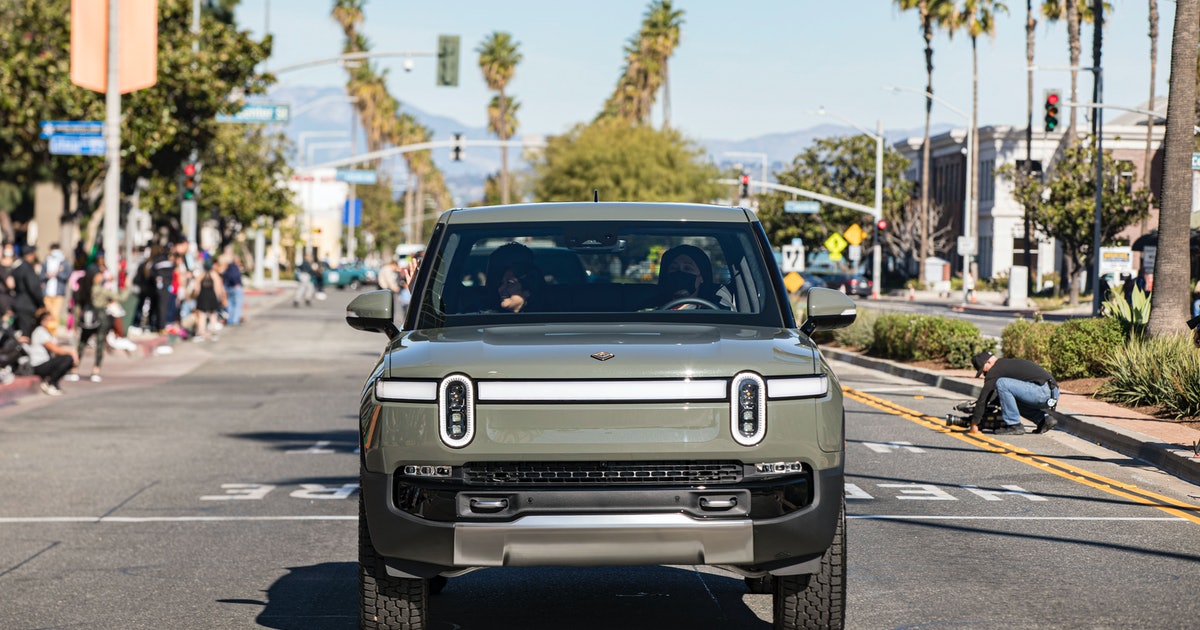
Rivian just reversed its controversial R1T and R1S price increase — here’s why
Rivian has reversed its controversial price increase for pre-ordered vehicles, the company announced last week.
On March 1, the California-based electric vehicle company revealed that the base price for its quad-motor R1T truck and R1S SUV would rise by $12,000 and $14,500, respectively. But Rivian faced widespread backlash on social media after it emerged the price increases would also apply to customers who had already pre-ordered the vehicle.
On Thursday, CEO RJ Scaringe released an open letter announcing that it would honor the original price of pre-orders prior to the March 1 announcement. Customers with orders prior to this date who canceled their pre-order after the price hike can also re-instate the order at the originally-agreed price.
The controversy reflects the issues facing manufacturers amid soaring inflation and supply chain issues. Tesla worked to overcome chip shortages, in part through substituting with alternatives.
Others have been less fortunate — Kelly Blue Book reported in December 2021 that new car prices had risen for eight months straight, a 13 percent rise year-over-year. In February, it reported that new car prices appear to have peaked, but their decline will be slow.
The outdoors-focused Rivian started producing its first electric vehicle, the R1T truck, in September 2021. The vehicle initially had a starting price of $67,500 for a model with a quad motor configuration. The Rivian R1S SUV is expected to start shipping sometime this year.
The company’s initial public offering in November 2021 impressed investors, as the price soared 67 percent in the first week of trading. Rivian is also expected to provide 100,000 all-electric delivery vans for Amazon by 2025.
But the New York Times reported concerns last month around the company’s prospects, as Amazon remained quiet on whether it had received any vehicles as expected and the company refused to comment on how many vehicles it may deliver in 2022. As Rivian seeks to establish itself as a key player in the nascent EV market, the rise brings unwanted negative publicity to the new automaker.
Rivian price rise: What happened
On March 1, Rivian updated its website to reveal that the entry price for the two quad-motor vehicles had risen:
- The R1T, originally $67,500, now costs $79,500 for the same configuration
- The R1S, originally $70,000, now costs $84,500
Alongside these tweaks, the company rolled out the option to pre-order versions of the R1T and R1S with fewer motors and smaller battery packs. That means the cheapest version available for order, expected to ship in 2024, starts at $67,500 for the R1T and $72,500 for the R1S.
Jiten Behl, Rivian’s chief growth officer, told The Verge that the company faces “inflationary pressure, increasing component costs, and unprecedented supply chain shortages and delays for parts (including semiconductor chips).” Behl also noted that the prices were originally set in 2018.
Rivian’s post about the changes received nearly 500 replies, with many customers furious that these changes would apply to pre-orders that had yet to be finalized.
Two days later, Scaringe wrote in an open letter that semiconductors, sheet metal, and seats had all shot up in price, which meant new vehicles prices had risen 30 percent since 2018. Announcing the new policy that would reverse the price rises for pre-order customers, Scaringe wrote:
“As we worked to update pricing to reflect these cost increases, we wrongly decided to make these changes apply to all future deliveries, including pre-existing configured preorders. We failed to appreciate how you viewed your configuration as price locked, and we wrongly assumed the announced Dual-Motor and Standard battery pack would provide configurations that would deliver price points similar to your original configuration. While this was the logic, it was wrong and we broke your trust in Rivian.”
Scaringe also noted the poor communications around the price rise.
“We also didn’t manage communications well. We didn’t give you enough insight into what was driving these decisions. The most important aspect of what we are building is our relationship with all of you. As we demonstrated earlier this week, trust is hard to build and easy to break. In speaking with many of you over the last two days, I fully realize and acknowledge how upset many of you felt. I have made a lot of mistakes since starting Rivian more than 12 years ago, but this one has been the most painful. I am truly sorry and committed to rebuilding your trust.”
Amid rising prices, Rivian’s experience highlights the importance of clear messaging and customer support.
Rivian has reversed its controversial price increase for pre-ordered vehicles, the company announced last week. On March 1, the California-based electric vehicle company revealed that the base price for its quad-motor R1T truck and R1S SUV would rise by $12,000 and $14,500, respectively. But Rivian faced widespread backlash on social media after it emerged the…
Rivian has reversed its controversial price increase for pre-ordered vehicles, the company announced last week. On March 1, the California-based electric vehicle company revealed that the base price for its quad-motor R1T truck and R1S SUV would rise by $12,000 and $14,500, respectively. But Rivian faced widespread backlash on social media after it emerged the…